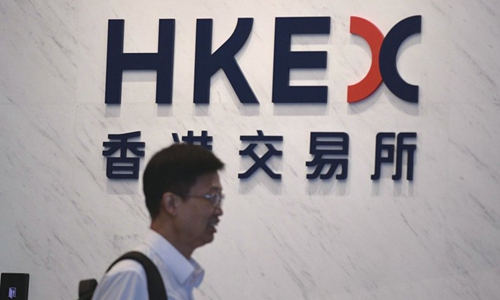Secondary flotations of US-listed Chinese companies buoy prospects as Hong Kong bourse rolls out reforms

A concept photo of stock market of Hong Kong Illustration: VCG
Hong Kong Exchanges and Clearing Ltd (HKEX) will witness an outburst of secondary listings by US-listed Chinese companies that is expected to bolster the exchange's prospects with more reforms to be worked out to process IPOs.
The Stock Exchange of Hong Kong Ltd, a wholly-owned subsidiary of HKEX, published on Friday the conclusions to its consultation on the exchange's proposals to enhance and streamline the listing regime for new issuers.
The revised listing regime for overseas issuers will result in that so-called Greater China regional issuers without a weighted voting rights (WVR) structure apply for a secondary listing without demonstrating they are an "innovative company" and with a lower minimum market capitalization at listing than currently required.
Greater China issuers without a WVR structure applying for secondary listing on the Hong Kong bourse must have a minimum market capitalization at the time of listing of at least HK$40 billion ($5.13 billion) or HK$10 billion and revenue of at least HK$1 billion for their most recent audited financial year.
While under the new regime, these issuers would be required, instead, to have a minimum market capitalization at the time of listing of at least HK$3 billion, if they can demonstrate a track record of good regulatory compliance of at least five financial years on a qualifying exchange or HK$10 billion, or if they can demonstrate a track record of good regulatory compliance of at least two financial years on a qualifying exchange.
"These reforms will enhance the exchange's reputation as the global listing venue of choice and will broaden investment opportunities for investors in Hong Kong. At the same time, implementation of the proposals will ensure that Hong Kong maintains its high standards of shareholder protection," said HKEX Head of Listing, Bonnie Y Chan.
"This new framework will support a whole new generation of international and regional issuers seeking a listing in Hong Kong. It will help facilitate orderly and efficient listings for the strong pipeline of applicants seeking secondary listings, those looking to return to Asia as a home market, and those exploring an IPO for the first time," Chan said.
The amended listing rules will take effect from January 1, 2022.
"The loosened requirement on market capitalization adjusting from HK$40 billion to HK$3 billion marked a big move and it becomes friendlier with small firms with a strong innovation focus, which have both demand for financing and internationalizing their business," Chen Li, chief economist of Chuancai Securities, told the Global Times on Sunday.
It also bodes well for the US-listed Chinese companies which are considering Hong Kong as the ideal destination for their secondary flotations, and it is a market-oriented choice, Chen said.
Chinese social media company Weibo has been approved by the Hong Kong bourse's listing committee to sell shares in the city on November 19, according to regulatory filings, giving it a secondary listing alongside New York.
Data security matters
The lowered threshold for secondary listing came at the moment that a number of firms which have been listed in the US or previously had the intention to do so now find themselves in a tug of war between China's strengthening regulation on outbound data transfer to enhance national security, pitted against the US' unfriendly environment as the US Securities and Exchange Commission (SEC) in August started to issue new disclosure requirements to Chinese companies seeking to list in New York as part of a push to boost investor awareness of the risks involved.
China's top cyberspace regulator issued in July a sweeping set of draft rules for cybersecurity reviews over domestic internet companies that seek overseas listings following Didi Chuxing's IPO in the US. The new threshold dictates that businesses holding information of more than a million users in China must undergo a regulatory review before applying for an overseas IPO.
Following the tightening supervision, many companies preparing to go public in the US have reportedly cancelled their listing plans. The popular fitness app Keep and online audio-sharing platform Ximalaya both pulled back their IPO plans, according to the Financial Times.
Chinese start-up Xiaohongshu, or "Little Red Book," is weighing a Hong Kong IPO to raise at least $500 million, after putting its US listing plans on hold, Bloomberg reported in October, citing people familiar with the matter.
"Companies should raise their anti-risk awareness and adjust accordingly with the nation's policy updates when it comes to national interests concerning data's cross-border transfer," Dong Shaopeng, a senior research fellow at the Chongyang Institute for Financial Studies at Renmin University of China, told the Global Times on Sunday.
The trend of strengthening outbound supervision of data is set to remain in place for the years to come, and companies need to enhance their bottom-line mindset to comply with rules both at destination stock market and domestic ones, said Dong.
"We have always maintained an open attitude for Chinese companies' choice about where to get listed, and we support companies' choices between international and domestic markets in line with laws and regulations," a spokesperson for the China Securities Regulatory Commission (CSRC) said in August.
Given these environmental changes, experts believe that the allure of Hong Kong stock market will be further boosted as a fundraising venue in Asia, and the bourse will usher in new growth momentum with more good US-listed Chinese firms choosing to come back for a secondary listing as most of them belong to the new economy business.
The Deloitte China Capital Market Services Group predicted that so long as there are no substantial changes to regulatory measures, the Hong Kong IPO market is well set to meet its forecast of about 110-120 IPOs - raising nearly HK$400 billion by the end of December 2021, thanks to a long and strong pipeline of nearly 200 IPO applicants as of end-September, including primary dual listings and listings from new economy businesses.



